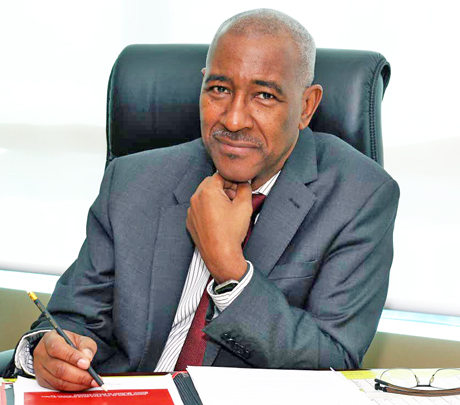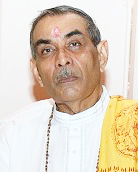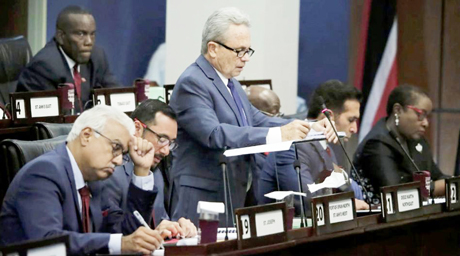Trinidad & Tobago
Opposition in dark over lightbulb plan

Port-of-Spain – Opposition leader Kamla Persad-Bissessar last week admitted to being in the dark regarding the government’s plan to distribute 400,000 LED bulbs to households across the country, and wondered whether it was the government’s one bright idea to introduce energy efficiency to Trinidad and Tobago.
In reply to Persad-Bissessar’s quip, Public Utilities Minister Robert Le Hunte said the government’s light bulb initiative was part of an ongoing energy efficiency campaign. It would eventually lead to more money in people’s pockets, and at the same time reduce the government’s electricity bill, he claimed.
Le Hunte was responding to the component in Finance Minister Colm Imbert’s 2020 budget that promised to replace incandescent bulbs with energy-efficient ones. The plan would see 400,000 households receiving lightbulbs free of charge, followed by the removal of taxes and duties on LED bulbs for five years.
However, Persad-Bissessar was quick at the switch, firing back that nationals needed jobs, not lightbulbs. She wondered with pointed humour, “Was this the brightest idea the government could come up with?”
In response, Le Hunte said the LED bulb move was one in a series of energy saving initiatives undertaken by his ministry to promote energy efficiency and conservation among citizens. He added the government planned to begin with the LED bulb rollout through installations beginning at Tower C at the Port-of-Spain International Waterfront. The move would help reduce the State’s electricity bill by millions of dollars, he claimed.
Le Hunte also claimed using LED bulbs could reduce a household’s electricity bill by 25 percent, and also, its life was ten times longer than an incandescent bulb.
“This is a good thing for the country. It’s a pity that some of us, when we don’t seem to understand things, we seem to trivialise it. And that is unfortunate,” Le Hunte said.
It would be a win-win situation for nationals, the country, and for the environment, he said, while insisting, “We have to reduce our CO2 emissions.”
At this time, the government is yet to come up with a plan to distribute the bulbs, and were looking at models from other countries, Le Hunte noted. T&TEC customers may be either asked to bring in their old bulbs, which would be replaced with new ones, or the new bulbs may be delivered to the homes of customers. A cap would be in place on the number of bulbs distributed to each household.
Said Le Hunte: “We are not the first country that is doing this. The proper tendering practices need to be put in place ...and we will do that to ensure that the population benefit from this initiative. It’s all part of changing people’s behaviour. I have recognised how people are sometimes skeptical. You sometimes have to jump-start something. This will jump-start an action that will be beneficial.”

Speaking at the inauguration function in St Augustine, east Trinidad, Opposition Leader Kamla Persad-Bissessar said Parasram has been integral in the development of treatment of mental illness, and remains compassionate as a leader in the field of psychiatry. She also described Parasram as committed to improving humanity and dedicated to spiritual enlightenment.
Parasram’s dedication to the development of Trinidad and Tobago in the fields of medicine, academia, humanitarianism, and politics is recognised nationally and regionally, Persad-Bissessar noted.
“Anyone knowledgeable about the field of psychiatry in Trinidad and Tobago is familiar with Dr Rampersad Parasram, who has been integral in the development of treatment of mental illness. As a doctor of psychiatry, a leader in the field, he has demonstrated compassion and ingenuity throughout his tenure,” Persad-Bissessar said.
Parasram has served as Chief Medical Officer, chairman of the North Central Regional Health Authority, associate lecturer at the UWI Faculty of Medicine, and as a member of the Medical Council of the Medical Board of Trinidad and Tobago. He was awarded the Public Service Medal of Merit (Gold) in 2004 for his contribution in the field of medicine.
Parasram was also the first chairman of the UNC, with Persad-Bissessar saying he helped shape the philosophies of the party.
Persad-Bissessar said citizens are called upon to protect and build communities and to provide the knowledge, support and guidance needed to restore positive values, and she was confident Parasram would lead the thrust in his new role as the Dharmacharya.
UWI economist
“When you talk to people on the streets, there’s the concern of layoffs, companies closing, reductions in the workforce. To the everyday person out there, there seems to be a significant fear with respect to layoffs. This includes graduates from the UWI and other institutions,” Deonanan said.
Deonanan said the main question that needs to be addressed following the 2020 budget presentation was. “Where are the jobs coming from?”
Said Deonanan: “When we look at the budget, does it hold out any promise of jobs? And it’s not just about short-term employment but sustainable jobs.”
Sustainable jobs within an economy have ripple developmental effects beyond the individuals involved, Deonanan said.
“It affects human capital overall, which is a basis for development. Career-oriented jobs also have to do with the quality of institutions, and these are major factors that help long term development,” he said.
Deonanan noted there is insufficient current data to give an accurate picture of what is going on with respect to employment in Trinidad and Tobago. However, he cited the latest data from the Central Statistical Office, which was from 2017.
According to these figures, there was a prolonged period of more and more people being employed from the late 1990s to 2007 to 2008, which he called the “boom period”.
The total number of unemployed people began increasing following this period, he said. However, he added the official data do not tell us all that is going on.
Said Deonanan: “There's the shadow economy and losses in those sectors and there's a lot that's unrecorded.”
He said a greater focus on Foreign Direct Investment is needed, which will result in job creation, an increased tax base, capital, and education in new technologies.
He said 90 percent of the FDI government has been able to attract is related to the petroleum sector. But successive budgets have shown that the income from this sector has decreased.
Said Deonanan: “This limits the ability of the government to provide jobs.”
He also noted Central Bank data show FDI trending upwards from 1990 through the “boom” period, resulting in job creation.
“In the late 2000s there was a decline and from 2014 upwards a significant decline,” he said.
Deonanan said there is a need to go beyond the petroleum sector to attract different forms of FDI, adding that there are tremendous opportunities in the renewable energy industry.
diaspora bonds
Regarding her pitch to nationals living abroad, Persad-Bissessar said: “We will request both the Ministry of Finance and the Central Bank to prepare an action plan for issuing diaspora bonds to the Trinidad and Tobago diaspora community.”
It was a presentation that sounded more like an election manifesto for upcoming elections next year, rather than a response to the 2020 budget, which was presented early last week.
Kamla Persad-Bissessar accused the government of being a “light bulb gang”, referring to its plan for free, energy-efficient light bulbs, part of its 2020 fiscal package, and of having “fumbled and stumbled” for four years. At the same time, she vowed a new UNC government will immediately turn on the governance switch without a honeymoon period.
“There was no imagination, no innovation, no creativity, no ideas, no vision,” in the 2020 budget, she said, describing it as trite, and noting after spending (TT) $200 billion during its term, the government had no fruits to celebrate in its final term.
However, while having achieved nothing substantial, Persad-Bissessar said the government keeps saying, “Coming soon!”, and “Stay tuned!”
She addressed the nation as the leader of the UNC, telling them, “To every citizen I say, ‘We can still save our country’.” She then invited nationals to add to her National Economic Transformation Master Plan 2020-2025.
Said Persad-Bissessar: “I ask you to examine for yourself, the plans I have outlined for you. Talk about them. Debate them. Ask questions. Make suggestions. Get involved! Let us have a national conversation. Let us bring all the people into the process. This must not be just my plan. It must be our plan.”
This was a new political culture, where the UNC tells its plans a year before elections, to be judged on concrete plans and a track record of delivery, she said.
Among ideas thrown out for national consideration were those for the environment, individuals, business, and governance. At the tip of her plans were 25 items to be achieved in the first 90 days of a UNC administration, with most of them focused on governance and the environment.
“We will immediately ban all single-use plastic straws and mandate SWMCOL to develop a new national recycling education programme. We will repeal the property tax legislation. We will scrap the proposed revenue authority,” Persad-Bissessar said.
Additionally, outstanding VAT refunds will be paid by interested persons from the Heritage and Stabilisation Fund, while personal and corporate taxes will be lowered. The Praedial Larceny Squad will be put into the police service.
Persad-Bissessar also proposed a solar city at Tamana, and solar energy in homes, plus a science city at Couva, with one percent of gross domestic product going to research and development. Saying public housing will have solar-powered lights and water heaters, she said, “All street lighting in new developments will be solar and/or wind powered.”
She also proposed that CEPEP workers will boost recycling and work in agriculture. Persad-Bissessar suggested taxation be based on consumption not earnings, with zero VAT for exporters.
Persad-Bissessar also proposed to re-establish an iron and steel industry, and said she would boost Tobago through a reliable seabridge, loans for hoteliers, duty-free designation, and a cruise ship complex-marina at Plymouth.
“[The BIR] spoke to them and they stepped up,” Imbert said. He noted it was an amazing total collected during the tax amnesty.
Imbert gave a breakdown of the $2.38 billion collected, indicating that $750 million came from oil companies, which represented 31 percent of the money collected.
Another $577 million came from corporation tax, while $432 million was collected from withholding tax. Around $200 million came from VAT, while $94.9 million came from the Pay as You Earn component. Imbert noted the tax amnesty of 2016 had a target of $500 million, and yielded $750 million.
He said he expected $800 million in revenue to be collected this time around, so the final figure was incredible. Imbert said because of this collection, the government's overdraft, which is normally high just before the presentation of the budget, was lower.
The months of September, October, and November are usually very difficult months for the Ministry of Finance, he revealed.
“Believe it or not, we went into October with an overdraft of under 90 percent and that is all because of the tax amnesty. In fact, it went down to 82 percent. It is really a feeling of relief for us in Finance that we don't have to hustle and go and borrow to pay our bills in October and November,” he said.

In his delivery of the 2020 fiscal package, Imbert proposed the 15 percent increase to CEPEP and URP workers, with the measures taking effect from December 1. However, at the time of the budget presentation, the date for local elections was not known. Four days later, Prime Minister Keith Rowley announced December 2 as the date of the polls.
By the weekend, analysts had taken a closer look at Imbert’s fiscal package, with a key, eye-raising discrepancy emerging, which political scientist Dr Bishnu Ragoonath said required some answers.
Said Ragoonath: “That was a nice trick the Minister of Finance played upon all of us, and particularly so, [on] the workers of CEPEP and URP… if you understand what has happened, what [Imbert] didn’t tell us is simply this that the budget for CEPEP has been reduced for 2019-2020.”
He explained that the budget was reduced by more than $15 million. “[Now] what that would mean is that if you are taking the same budget from last year and you were going to increase people’s salary by 15 percent, let’s just say they were working nine months last year, eight months this year, and when you reduce the budget by a further $15 million dollars, you’ll probably be working seven months.”
Ragoonath said Imbert did not make this fact known when he read the budget.
Said Ragoonath: “But for us who have analysed the data and the estimates of expenditure, it is clear that they have reduced [CEPEP’s] budget. So, if you are keeping the same pool of workers, but you have increased their salaries and you have reduced the sum, they going to work for less, and that’s an election ploy… [It is] either you work less in terms of length, or less in terms of numbers.”
A perusal of the budget documents shows for 2018-2019, CEPEP received $369,613,280; for 2019-2020, the allocation is $347,876,000 – what this means is CEPEP is actually receiving $21,737,280 less this time around. Imbert offered no explanation for the discrepancy.
For the URP, in the 2018-2019 period, the programme received $6,157,000; for the coming 2019-2020 period, it will receive $6,505,000, an increase of $348,000. The explanations column of the document states, “Includes provision for vacant posts with incumbents.”
The discrepancy concerned the Opposition, with former Minster of Housing and Urban Development Dr Roodal Moonilal, who managed CEPEP for five years, describing it as a deception.
Said Moonilal: “There is the possible loss of jobs because you can’t finance an organisation [where you are] now increasing its labour bill and reducing the overall subvention to the company… Clearly they are going to downsize and retrench CEPEP contractors and workers.”
Moonilal added another area of worry was “the “majority of CEPEP workers work for the minimum wage, [so] when you increase their salary by 15 percent it is less than the new minimum wage, and this is illegal.”
He said what should be done is the new $17.50 minimum wage should be applied to the worker’s salaries first, following with application of the 15 percent increase.
Clarification of these issues was needed from the government, he said.
In response, over the weekend Imbert slammed what he described as “malicious scaremongering” and reporting by the media. Despite the discrepancies being prominent in the figures presented in the budget document, through social media, Imbert declared in a tweet, “No facts. Dishonest analysis. Mischievous agenda.”
Additionally, “ALL CEPEP workers will be paid their proper increased salaries in 2019. Working hours will not be reduced.” He also said the “number of CEPEP workers in 2019 will be the same or more than in 2018.”
In a subsequent statement issued by the Finance ministry, Imbert said it was wrong, “inexcusable and irresponsible” for Ragoonath to describe the proposed increases as an “election ploy” or a “trick”.
He added Ragoonath should not “make these baseless and scandalous statements” without any facts. It was “unscientific, illogical and bordering on political mischief for a supposedly neutral commentator” to look at a mere number in the Draft Estimates of Recurrent Expenditure and conclude workers were being tricked as an election ploy.
Imbert said it was also wrong to conclude the government plans to either reduce the working hours, or the number of workers this year.
“Even a cursory glance at the estimates over the years will reveal the budgetary allocations for all projects and programmes are routinely revised during the year and supplemented, as and where required,” he said.
“[We] are trying to ascertain what charges and how many charges can be laid on relevant individuals,” Griffith said.
He said police were conducting interviews with the 69 people rescued from the facility. Griffith also noted a “variety of different charges” can be laid against the six people “held for questioning”.
Said Griffith: “In some cases it can be a situation of slavery, which can then link to possible charges of human trafficking. It can link to kidnapping or persons being held there through family members forcing them to sign blank cheques and extracting funds out of their own bank accounts.”
He added: “This is definitely not rehabilitation that I can see that can help an individual get back on their feet. In a proper rehabilitation you must have the proper medical practitioners at the facilities to ensure that persons improve.”
Griffith said a few reports gathered from the 69 people indicated they were taken by people looking like police officers, handcuffed, and then carried to the centre against their will.
He vowed to “take down” any police officer and all persons who were “part and parcel of what may be deemed as slavery/human trafficking/ kidnapping”.
Griffith said the vast majority of the rescued were grateful to police, as they were being held against their will in “prison cells about five feet by five feet”.
Said Griffith: “A small bed couldn't even fit [in the ‘cell’]. We actually saw shackles on beds. Some of them said they were tortured with tasers and batons.”
Additionally, “We think this is a bigger picture of persons actually abusing elderly persons in this country. What is shocking is that there are actually persons in Trinidad and Tobago that are actually upset about what we have done.”
